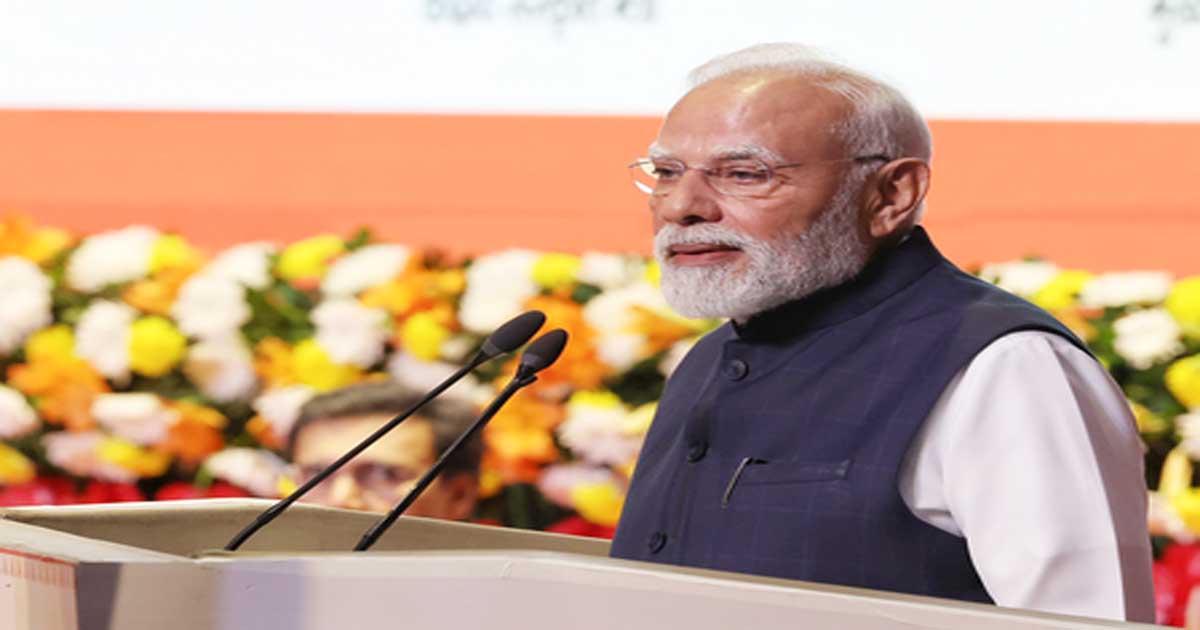Business
CAIT urge government to take action against e-pharmacy companies, including Amazon, Flipkart, Reliance

Training its guns on e-pharmacy companies, Confederation of All India Traders (CAIT) on Monday strongly raised the issue of malpractices being conducted in online pharmacy trade.
CAIT alleged that primarily Pharmeasy, Medlife, 1Mg, Netmeds (now owned by Reliance Group), Amazon (foreign company owned by Amazon) Flipkart (owned by foreign company Walmart) are conducting business practices in contravention of provisions of The Drug & Cosmetics Act, 1940 and misusing the e-commerce landscape by operating on rock bottom prices with 30 per cent-40 per cent discount and free shipping.
It’s a case of capital dumping in these e-pharmacies by foreign behemoths which is proving extremely detrimental to the future of the lakhs of crores of small chemists across the country . The retail chemists are the last mile connectivity and emergency provisioning is ensured by brick-and-mortar retailers who in turn also provide livelihood to millions of retail pharmacies, their families and employees
The CAIT has once again reiterated while its demand for issuance of a fresh press note in lieu of Press Note 2 of the FDI policy to make Indian e-commerce trade free from all glitches and a competitive level playing field for all stakeholders and formation of a Regulatory Authority to monitor and regulate e commerce business in India.
CAIT National President B.C. Bhartia and Secretary General Praveen Khandelwal said that mushrooming of e-pharmacy is causing huge hardships to the retail chemists and distributors in the wake of anti-competitive practices like capital dumping and deep discounting leading to predatory pricing. Brick and Mortar medicine retailers, including retail chemists and distributors are the first points of contact for needy patients across the country. E-pharmacies with their financial backing by large foreign players/funds have started disrupting brick and mortar retailers due to the unmatched and often unsustainable pricing.
They further said that It is important to note that sale of prescription drugs and medicines through online medium is illegal. The legal regime, under Drugs & Cosmetics Act, 1940, does not permit home delivery of prescription medicines for which a prescription “in original” is required.
Bhartia and Khandelwal said that the e-pharmacies like Pharmeasy and Medlife indulged in deep discounting on their platforms by giving a flat discount of 30 per cent. To capture the market even further, an additional cashback of 20 per cent is extended to customers with free shipping. Effectively, this translated to a whopping discount of around 40 per cent-45 per cent with free shipping.
Predatory Pricing is done with the sole intention of eliminating the market competition. E-pharmacies have indulged in predatory pricing immediately after the lockdown by offering a 25 per cent discount on medicines and an astronomical 75 per cent discount on wellness products, a market that had begun expanding after the recent Covid-19 pandemic. While even a 25 per cent discount on medicines is capable of distorting the market, a 75 per cent discount on a market that had just begun to swell up is daylight robbery since it not only erodes the customer base of traditional retailers but also creates an unhealthy competition, one that is unsustainable in the long run.
Bhartia and Khandelwal said that by using consumer data, which is otherwise not available to traditional players, e-pharmacies like Pharmeasy & Medlife (owned by Dharmil Seth and investment from Temasek, etc.) and 1Mg (Prashant Tandon, investment from Sequoia and now slated to merge in Tata Group) Netmed of Reliance, Amazon and Flipkart have offered a minimum discount of 30 per cent at the start of the month and approximately 40 per cent discount at the end of the month to cater to the analysis and resultant trend that spending reduces end of the month.
The CAIT has demanded that beside general e-commerce where rules and policies are being flouted at a high magnitude level, the e-pharmacy has become another trade which is being targeted by these heavily funded companies to capture and monopolised at the cost of uprooting of lakhs of chemists and medicine traders across the country. Therefore, immediate intervention of the government is required to stop this menace.
Business
PM Modi to inaugurate India Mobile Congress 2025 on October 8

New Delhi, Oct 6: Prime Minister Narendra Modi will inaugurate the India Mobile Congress (IMC) 2025, Asia’s premier telecom and technology event, on October 8 in the national capital, Ministry of Communications said on Monday.
The four-day mega event, themed “Innovate to Transform,” will run till October 11 and is expected to showcase India’s growing leadership in the global digital and telecom space.
Union Minister for Communications Jyotiraditya M. Scindia visited the IMC 2025 venue to review the final preparations ahead of the Prime Minister’s inauguration.
Scindia also travelled to the venue and back via the Airport Metro, symbolising India’s push for modern and sustainable urban transport.
During his visit, the minister toured the exhibition area, interacted with participating startups and exhibitors, and chaired review meetings with senior officials from the Department of Telecommunications (DoT), the Cellular Operators Association of India (COAI), and other partner agencies.
Speaking to the media, Scindia said that IMC 2025 would mark a new era in global connectivity, where technologies like 5G, 6G, artificial intelligence (AI), machine learning (ML), the Internet of Things (IoT), and satellite communications would come together to shape the future.
He emphasised that the event reflects Prime Minister Modi’s vision of a self-reliant and innovative India that connects not only within but also with the world.
IMC 2025 is expected to attract more than 1.5 lakh visitors, 7,000 delegates from over 150 countries, and 400 exhibitors spread across 4.5 lakh square feet.
The event will also feature over 1,600 technology demonstrations and 100 sessions with more than 800 speakers discussing the latest developments in telecom and digital innovation.
Highlighting the scale of the event, Scindia said that IMC has grown from being a national platform to becoming a global technology congress that represents India’s digital leadership.
He added that the 2025 edition will include six major global summits — covering 6G research, artificial intelligence, cybersecurity, satellite communications, startups, and the Global Startup World Cup — India Edition.
The minister also underlined India’s achievements in the telecom sector, noting that the country now ranks among the world’s top three digital economies with 1.2 billion mobile subscribers, 970 million internet users, and the fastest-ever 5G rollout completed in just 22 months.
Business
Sensex rises 583 points, Nifty tops 25,000 as IT and banking stocks lead rally

Mumbai, Oct 6: The Indian stock markets continued their winning streak for the third straight session on Monday, driven by strong buying in the IT and banking shares.
The benchmark Sensex jumped 582.95 points, or 0.72 per cent, to close at 81,790.12, while the Nifty rose 183.4 points, or 0.74 per cent, to end the day at 25,077.
“From a technical perspective, Nifty has successfully broken above the key psychological and technical resistance level of 25,000, turning the structure decisively positive,” analysts said.
“Any dip toward the 25,000 zone is expected to act as a strong support level, with immediate resistance seen at 25,200 and 25,500,” they added.
The Bank Nifty also delivered a stellar performance, opening with a gap-up and maintaining its upward trajectory through the session.
The index surged past 56,100, hitting an intra-day high of 56,164, with next resistance levels seen at 56,300–56,500, and support placed around 55,821–55,500, experts stated.
Broader markets also joined the rally, with the Nifty Midcap 100 gaining 0.89 per cent and the Nifty Smallcap 100 inching up 0.28 per cent.
In the Sensex pack, TCS, Tech Mahindra, Eternal, Axis Bank, and Bajaj Finance were the top performers, climbing as much as 3 per cent.
Meanwhile, Trent, Tata Steel, Power Grid, and Titan ended the session with losses. Among sectors, IT stocks led the gains as the Nifty IT index surged 2.28 per cent.
The Nifty Private Bank, Financial Services, and Healthcare indices also closed in positive territory.
On the other hand, Metal, FMCG, and Media shares came under pressure, slipping up to 1 per cent.
Market experts said the upbeat sentiment in IT stocks and strong institutional buying supported the overall market momentum.
“The domestic equity market ended the session on a positive note, led by gains in the financial services and IT sectors, ahead of the Q2 results,” they said.
“The banking index outperformed, bolstered by strong quarterly updates announced by large scheduled banks and attractive valuations, while hospital stocks surged following the revision of CGHS rates,” market experts added.
Business
SAIL fortifies Indian Navy fleet with special-grade indigenous steel

New Delhi, Oct 6: Public sector giant Steel Authority of India Limited (SAIL) has supplied the entire requirement of special grade steel for the INS Androth, commissioned into the Indian Navy on Monday, marking a proud milestone in the country’s journey to achieve self-reliance in the defence sector.
INS Androth is the second vessel in the series of Anti-Submarine Warfare Shallow Water Craft (ASW-SWC) corvettes, the first being INS Arnala, which was commissioned on 18th June this year.
SAIL has supplied the full quantity of special grade steel – including HR Sheets and Plates – for the eight ASW-SWC, including INS Arnala and Androth, being built by Garden Reach Shipbuilders and Engineers Ltd. (GRSE).
The steel was sourced from SAIL’s plants in Bokaro, Bhilai and Rourkela. INS Androth’s commissioning underscores India’s growing maritime capabilities and the nation’s commitment to “Aatmanirbhar Bharat,” according to a SAIL statement.
SAIL had also supplied 8,000 tonnes of critical-grade steel for the country’s advanced frontline warships INS Udaygiri and INS Himgiri, which were inducted into the Indian Navy fleet in August this year.
SAIL played a crucial role in building these two advanced frigates for the Indian Navy. Partnering with Mazagon Dock Shipbuilders Limited (MDL) and Garden Reach Shipbuilders & Engineers Limited (GRSE), SAIL supplied essential critical-grade hot-rolled sheets and plates from its Bokaro, Bhilai, and Rourkela Steel Plants.
By developing and providing critical-grade steel for the Indian Navy, SAIL has made a significant contribution to import substitution and defence self-reliance, directly supporting the ‘Atmanirbhar Bharat’ and ‘Make in India’ initiatives and lessening India’s dependence on imported special quality steel for defence requirements.
Special Plate Plant at RSP alone has supplied over 100,000 tonnes of critical grade steel for defence applications like tanks, warships, and missiles, the statement said.
The commissioning of INS Udaygiri and INS Himgiri powerfully demonstrates the strength and depth of a fully indigenous defence ecosystem – from the foundational steel to the intricate design and dedicated crew.
SAIL’s enduring partnership with India’s defence sector is well-established, with a proud history of supplying critical-grade steel for iconic vessels such as the INS Vikrant, INS Nilgiri, INS Ajay, INS Nistar, INS Vindhyagiri, and INS Surat, among others. This unwavering commitment solidifies SAIL’s standing as a trusted national manufacturer and a vital collaborator in the country’s ongoing naval modernisation, the SAIL statement added.
-

 Crime3 years ago
Crime3 years agoClass 10 student jumps to death in Jaipur
-

 Maharashtra1 year ago
Maharashtra1 year agoMumbai Local Train Update: Central Railway’s New Timetable Comes Into Effect; Check Full List Of Revised Timings & Stations
-

 Maharashtra12 months ago
Maharashtra12 months agoMumbai To Go Toll-Free Tonight! Maharashtra Govt Announces Complete Toll Waiver For Light Motor Vehicles At All 5 Entry Points Of City
-

 Maharashtra1 year ago
Maharashtra1 year agoFalse photo of Imtiaz Jaleel’s rally, exposing the fooling conspiracy
-

 National News12 months ago
National News12 months agoMinistry of Railways rolls out Special Drive 4.0 with focus on digitisation, cleanliness, inclusiveness and grievance redressal
-

 Maharashtra11 months ago
Maharashtra11 months agoMaharashtra Elections 2024: Mumbai Metro & BEST Services Extended Till Midnight On Voting Day
-

 National News1 year ago
National News1 year agoJ&K: 4 Jawans Killed, 28 Injured After Bus Carrying BSF Personnel For Poll Duty Falls Into Gorge In Budgam; Terrifying Visuals Surface
-

 Crime12 months ago
Crime12 months agoBaba Siddique Murder: Mumbai Police Unable To Get Lawrence Bishnoi Custody Due To Home Ministry Order, Says Report


















